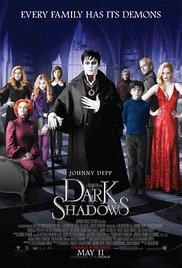 You’re going to read a lot of not very nice things about “Dark Shadows” on these here interwebs – including this – and while they are not without cause, let’s set something straight: this movie was positively bursting with potential. It’s a film adaptation of a daytime soap opera from the ‘60s and ‘70s that involved the supernatural, time travel and parallel universes (bonus points for being way ahead of the curve), with Tim Burton directing and Johnny Depp starring as a vampire. On paper, that’s a home run, but they don’t play the games on paper. There is a lot of story – over 1,200 episodes worth, the second longest running soap in history – that they try to condense into a little less than two hours, and it creates some issues in terms of flow. The worst thing about the movie, though, is that it’s boring. Tim Burton movies are many things, but rarely are they boring.
You’re going to read a lot of not very nice things about “Dark Shadows” on these here interwebs – including this – and while they are not without cause, let’s set something straight: this movie was positively bursting with potential. It’s a film adaptation of a daytime soap opera from the ‘60s and ‘70s that involved the supernatural, time travel and parallel universes (bonus points for being way ahead of the curve), with Tim Burton directing and Johnny Depp starring as a vampire. On paper, that’s a home run, but they don’t play the games on paper. There is a lot of story – over 1,200 episodes worth, the second longest running soap in history – that they try to condense into a little less than two hours, and it creates some issues in terms of flow. The worst thing about the movie, though, is that it’s boring. Tim Burton movies are many things, but rarely are they boring.
The story begins in 1760, as a young English boy named Barnabas Collins leaves with his family for the new world, where they establish a fishing empire in Maine, creating the roots for a town that would eventually be known as Collinsport. A grown-up Barnabas (Depp) has an affair with housekeeper Angelique (Eva Green), but he does not love her, and leaves her for someone else. What he doesn’t realize is that Angelique is a witch, and she punishes him for his crime of the heart by sending his fiancé to her death, turning him into a vampire, and burying him alive. A group of unfortunate people inadvertently release Barnabas from his grave in 1972, and the culture-shocked Barnabas must learn to adapt to the times, while doing his best to restore his family’s name and deal with his curse.
There are several interesting ideas and bits in “Dark Shadows,” but they fail to build any momentum, even when they take place back to back. It’s as if the cast shot four separate movies – the fish-out-of-water comedy, the romance, the family drama, and the horror film – and then Burton whittled them down to one film. It might run the gamut of emotions because of the stylistic choices, but none of it strikes an emotional chord, which is not a good thing when your primary goal is to victimize the ruthless vampire. In addition, several plot threads are left unresolved or, worse, game-changing revelations appear out of thin air, with little explanation. All concerned clearly bit off more than they could chew here.
And then, there but for the grace of God, is Johnny Depp, who commits to the role of Barnabas in a way that redefines Method acting. He had to know before they had finished shooting that “Dark Shadows” wasn’t working, but Depp refuses to give in to the material’s inherently campy nature and plays Barnabas bone-straight and dead serious from beginning to end. By comparison, Eva Green has it easy as the flashy, sexy Angelique, but her character is underdeveloped; despite the misery and heartache she’s caused him, the relationship between her and Barnabas would be a lot more interesting if she were more sympathetic. And we still haven’t discussed Michelle Pfeiffer, Helena Bonham Carter, Jackie Earl Haley, or Chloe Grace Moretz, which goes a long way towards explaining that, while this movie may feature a large cast, it is by no means an ensemble. Pfeiffer, in particular, is wasted here.
There is very little about “Dark Shadows” that makes sense, from its overreaching story to its release date (May? Really?). The smarter play would have been for Burton to shoot this one quick and on the cheap, like “Ed Wood,” and aim for a late September release on the art house circuit. Cult followings are nice, and “Dark Shadows” boasts a formidable one, but cult acts rarely make for good, successful summer blockbusters. This is no exception.
 (2 / 5)
(2 / 5)



